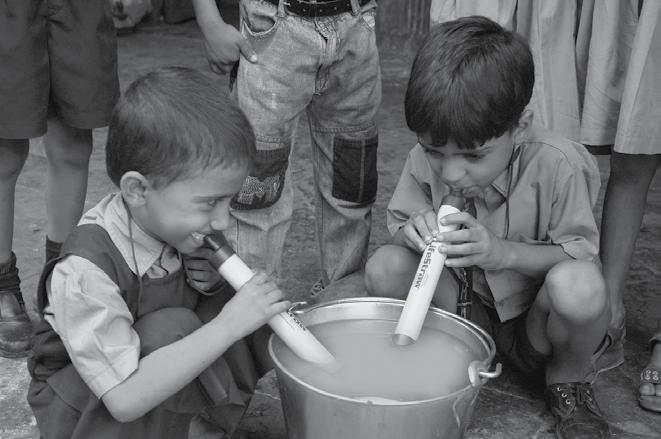3 minute read
TURNING GREEN
Next Article
It’s Easy Being Green at Park
BY ANNE HARVEY KILBURN, Park Parent Editorial Board
ABOVE: Raine Miller and Mike Massauro stand by their windmill, which was inspired by the story of an African boy named William Kamkwamba. You can read about him by going to the Internet and searching for his name. BELOW: Some of Park’s youngest environmentalists learned about windmills of all sizes this year.
The next time you pass through the circle in front of School, gaze up to your right toward the top of the fence that surrounds the playground. On a windy day, you ’ll see a spinning silver object. That shiny object is actually a small windmill built from scratch by Mike Massauro, Park’s director of operations. Inspired by an article about a boy who built a windmill to generate energy for his village in Malawi, Kindergarten teacher Raine
Miller sought out Mike to engage her young students in exploring how to erect one of their own. “I had given the article to Mike,” said Raine, after [fellow teacher] Toni Gilligan passed it on to me, and Mike said, ‘I think we should build a windmill.’ It is very exciting, and the kids are over the moon.” Exciting green educational activities abound at Park. In the
Upper Division, the Green Club, supervised by science teacher
Karen Manning, sold EcoUsable water bottles to raise funds for
LifeStraws®. These are personal water purifiers developed as a practical way of preventing disease and saving lives (visit www. vestergaard-frandsen.com). So far, the Green Club has collected more than $1,200, which will pay for 180 LifeStraws®. Club members are also making worm-composting bins, running a “lights out” campaign, replacing the paper cups in the dining room with reusable plastic cups (which uses approximately 15 times less energy overall), and recycling batteries, ink cartridges, and eye glasses during Earth month (April). They ’ re also helping
Mike with another windmill project that will run an air compressor to aerate the pond, replacing an old generator. In the Middle Division, Grade IV classes continue the very popular and successful Catalog Canceling project, which was launched by Ted Wells’ class and has spread to other schools from
Key West to South Dakota! Fourth-graders are also helping organize paper recycling for the entire school. Parents are engaged in green activities as well. On a beautiful fall afternoon in October, the Parents’ Association Green Committee sponsored a “Donuts and Daffodils” day. Park families planted 500 daffodil bulbs that should soon pop up around campus. The popular swap of Halloween costumes, blue blazers, and sports gear was also held in October. April’s Earth month will bring additional
Green Committee activities, including “Spring Cleaning” (reduce/ reuse/recycle) tips and other educational, fun events. And, don ’t forget that Park is officially a NO IDLING
ZONE. Please remind anyone who picks up your children in the carpool line (or drops off/picks up at a school bus stop) to turn off his or her car while waiting. The coming warmer spring days should help raise consciousness about this. We encourage you to do your part to save energy, reduce pollution, and protect our children ’s health. It’s easy!


4

1. Bulb Planting – Park families planted hundreds of daffodil bulbs and then enjoyed donuts, cider, and caramel apples one day in October, thanks to the P.A. Green Committee. Watch for those daffodils popping up near the swings and stone walls by the field. 2. Catalog Canceling – The Grade IV teachers told the kids they’d dye their hair green, wear wigs, and/or put on their recess recycling superhero costumes for a day if the kids broke their old record of 4,125 canceled catalogs. They did it by canceling 4,466 – which saved an estimated 74 trees! You can find out more at Ted Wells’ blog, at www.parkschool.org/blogs/ted_wells/home/. 3. LifeStaws® – Park students helped purchase portable water filters that help people obtain safe drinking water, both inside and outside.
4. Green Club members sold water bottles to buy LifeStraws®, which provide protection from waterborne diseases.

5. Cider Press – Back in October, Toni Gilligan’s Kindergarten class learned the fine art of cider pressing through the Earthworks organization. (www.earthworksboston.org)

2


